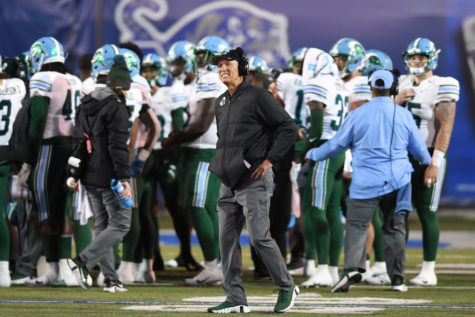From the Basement | What went wrong with Tulane football?
December 2, 2021

In short, everything. Both on and off the field, Tulane University football was plagued with issues and challenges that it needed to face. Analyzing both off and on the field issues will help illuminate why Tulane football went from being an early season contender in the American Athletic Conference, to being the doormat of the conference.
Off the field, the biggest challenge facing the team was the same challenge that Tulane University and the city of New Orleans faced: Hurricane Ida. Tulane athletics evacuated the team to Birmingham, Alabama to continue to prepare for the coming season.
The Green Wave showed great resilience in their first two games of the year, with a close loss in a hard fought game against the Oklahoma Sooners, then the second ranked team in the nation. Tulane then rolled over Morgan State for its first win of the season. Both of these games were originally supposed to be played in New Orleans, and were instead played in Norman, Oklahoma and Birmingham, Alabama respectively.
However, the biggest culprit to Tulane’s demise this season was, unsurprisingly, its defense. Time and again, the defense was ripped apart, giving up 61 to the Ole Miss Rebels, 52 to the East Carolina Pirates, 40 to the Houston Cougars and 55 to the SMU Mustangs.
In terms of points allowed per game, Tulane were 15th worst out of 130 schools, giving up 34 points per game. In comparison, during the 2020 season, Tulane had a middle of the pack defense, ranked 57th best and giving up 28.1 points per game.
Tulane sought to play an aggressive style of defense this season. This showed in many positive ways, as the hard hitting Green Wave forced 16 turnovers and sacked the quarterback 34 times. This is similar to last season’s unit, which had 17 turnovers and 37 sacks. So, where was the problem?
The Green Wave gave up too many big plays and too many yards each game. Opposing teams averaged over 400 yards a game, an abysmal number from Tulane’s defense. The worst pummeling came from the Ole Miss game, where the star studded Rebels had a staggering 707 yards of offense.
Two games later, Tulane’s defense hit their low point against East Carolina. The Pirates had 612 yards of offense, with 222 of those yards coming from their running back Keaton Mitchell.
Offensively, the Green Wave looked to quarterback Michael Pratt to lead them. Last season, Pratt proved to be a capable signal caller, throwing for 20 touchdowns, rushing for eight more and throwing only eight interceptions. He was also incredibly tough, as Pratt was sacked 33 times in 10 games.
This season started as more of the same for Pratt. In his first three games, Pratt threw for seven touchdowns, ran for one more, threw no interceptions and was sacked six times.
Unfortunately, the season turned on its head as he had bad games against University of Alabama Birmingham, East Carolina and Houston. His offensive line did him no favors either this season, as he was sacked 27 times in 11 games. It’s better than last season, but it is still not good. Against Houston, Pratt was sacked eight times.
Against SMU, Pratt took a vicious late hit after a slide, which injured him and forced him to sit out against Cincinnati. With the backup quarterback Justin Ibieta already out with injury, freshman Kai Horton was forced to step up. Horton deputized admirably, but Tulane’s offense clearly lacked the dynamism that Pratt provides.
really hope Michael Pratt is ok after taking this hit, wow. https://t.co/oXwBQzEDaG
— The Transfer Portal CFB (@TPortalCFB) October 22, 2021
Pratt struggled initially after returning from injury. He did not look his normal electric self in the losses to University of Central Florida and University of Tulsa, as he struggled to move the offense in both games. He did show off his incredible talent when the Green Wave dismantled University of South Florida, but finished out the season on a pedestrian note in the loss to Memphis.
From a coaching perspective, the team made many mistakes, and often seemed to not be able to play a full four quarters of football. Tulane’s season was filled with untimely fumbles, such as the several instances lost against Oklahoma, or undisciplined play, from the penalties Tulane committed, to Dorian Williams ejection against Ole Miss and the several unnecessary roughness penalties against the University of Cincinnati. Penalties, in particular, are an area that need to be cleaned up, as Tulane averaged six a game for 51.1 yards.
Things are not all bleak in uptown New Orleans, however. The defense did improve over the course of the season. They were able to keep the high powered UCF offense quiet, and kept Tulane in the games against Tulsa, Cincinnati and Memphis.
Offensively, Pratt is still a highly talented quarterback. Bad seasons happen to good players, and Pratt has shown over his two seasons that he has what it takes to be a great quarterback.
Willie Fritz will remain head coach of Tulane until 2026, and he has shown in previous seasons that he can both build a good football team but also a good program and culture. However, the coach will need to have a strong recruiting season with both incoming freshmen and transfers in order to make the team competitive again.
Next season, Tulane’s four non-conference games will be against Massachusetts, Alcorn State, Kansas State and the University of Southern Mississippi. All games will be at home, except for Kansas State.






















Cory Cuillier • Dec 22, 2021 at 1:22 am
I thought the season would go well. I predicted 9-3, worst case 8-4. I still feel there is a lot of talent on this team.